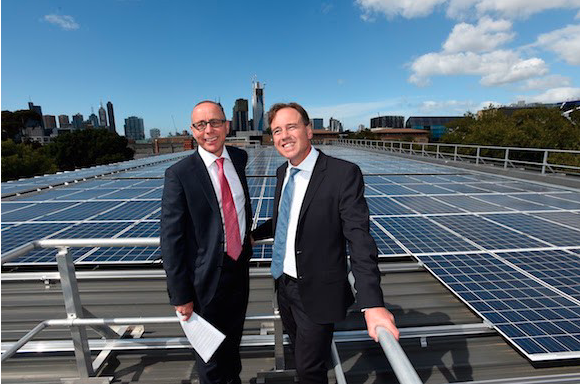University welcomes CEFC support for clean energy projects

The University of Melbourne has welcomed the announcement of a $9.1 million loan from the Clean Energy Finance Corporation, which will go towards a number of energy reduction and generation projects.
These projects involve the installation of renewable energy infrastructure across the University’s campuses, including solar photovoltaic cells, solar thermal and micro-wind turbines.
The funding will also extend to assist with energy reduction initiatives such as voltage optimization and freezer upgrades.
The projects form part of the University’s push towards zero emissions electricity over the coming years and carbon neutrality by 2030.
Federal Environment Minister Greg Hunt made the announcement on the University’s Parkville campus earlier today.
University Vice-Principal, Administration & Finance, and Chief Financial Officer, Allan Tait said the technologies being installed would provide a practical demonstration of the University’s strengthening commitment to sustainability.
“As a public-spirited university, Melbourne is committed to promoting sustainability through our operations, as well as in our research and education programs, particularly as the University has an obligation to show leadership in critical global issues such as those relating to climate change and sustainability,” Mr Tait said.
“These are among the key reasons we have embarked on the development of a sustainability charter, and why we are taking very significant steps to reduce our environmental impact, with the aim to move to zero emissions electricity and ultimately achieve carbon neutrality by 2030.”
CEFC Executive Director – Corporate and Project Finance Paul McCartney said the funding would assist the University in delivering carbon emissions savings of over 9 000 tonnes per year.
“Australia’s 39 universities make a major contribution to the national economy and to the Australian community,” Mr McCartney said.
“Yet they face the ongoing challenges of public budget restraint, intensifying global competition and the need to use cutting edge technology to meet increasing student expectations.
“Clean energy projects like the one being undertaken by the University of Melbourne can help universities meet these challenges through an investment that results in reduced environmental impact, higher productivity and stronger financial performance.”
The University of Melbourne, with some 47 000 students, has the energy requirements of a town the size of Warrnambool. Since 2006 the university has implemented an environmental sustainability strategy for its operation that has so far reduced energy usage per floor area by around 24 per cent.
It is one of the leading universities across the sector working to reduce its emissions of greenhouse gases, cut use of energy and adopt more renewable and sustainable energy sources as it develops its campuses for a sustainable future.
The University is currently developing a Sustainability Charter, which will identify its fundamental sustainability principles and a series of key commitments the institution will make towards sustainability across all organisational activities.